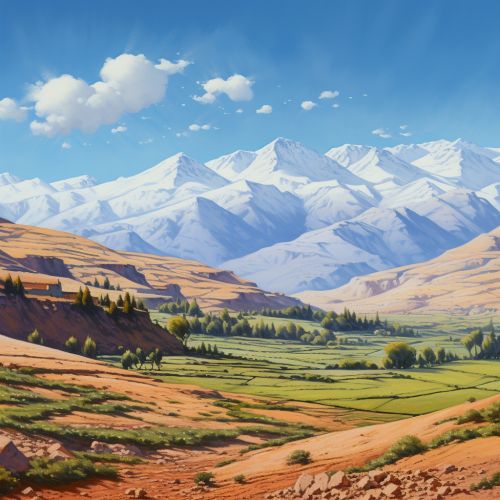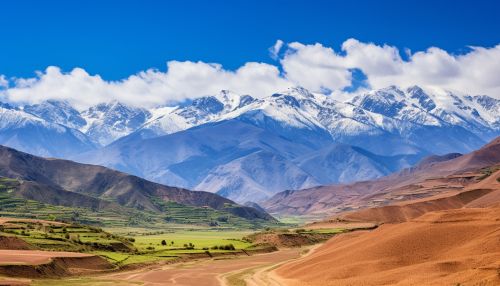Atlas Mountains
Geography
The Atlas Mountains are a mountain range in the Maghreb region, stretching across three countries: Morocco, Algeria, and Tunisia. The range's highest peak is Toubkal, standing at 4,167 meters (13,671 feet) in southwestern Morocco. The Atlas Mountains divide the Mediterranean and Atlantic coastlines from the Sahara Desert, creating distinct climatic zones.


Geology
The Atlas Mountains are primarily composed of metamorphic rock, such as schist and gneiss, as well as sedimentary rock like sandstone and limestone. The range is a result of tectonic activity during the Paleozoic era, approximately 300 million years ago, when the African and Eurasian tectonic plates collided. This collision led to the formation of the Anti-Atlas range, the oldest part of the Atlas Mountains.
Climate
The Atlas Mountains have a varied climate, largely influenced by their altitude and proximity to the Atlantic Ocean and Mediterranean Sea. The coastal regions experience a Mediterranean climate, with mild, wet winters and hot, dry summers. As one moves inland and up in altitude, the climate becomes more continental, with colder winters and hotter summers. The high peaks of the Atlas Mountains are often snow-capped, providing a source of water for rivers and streams that support agriculture in the valleys below.
Flora and Fauna
The Atlas Mountains are home to a diverse range of flora and fauna. The lower slopes are covered in Mediterranean forests, woodlands, and scrub, with species such as the Atlas cedar, cork oak, and Aleppo pine. Higher altitudes are characterized by alpine vegetation. The mountains are also home to a variety of wildlife, including the Barbary macaque, Atlas bear, and various species of birds and reptiles.
Human Settlement and Culture
The Atlas Mountains have been home to various cultures and peoples throughout history. The Amazigh, or Berber people, have inhabited the region for thousands of years, maintaining a distinct culture and language. The mountains have also seen the influence of Arab, Ottoman, and French cultures, particularly in the cities of Marrakesh and Fez in Morocco. The Atlas Mountains continue to be a significant cultural and economic region, with agriculture, mining, and tourism playing key roles.
